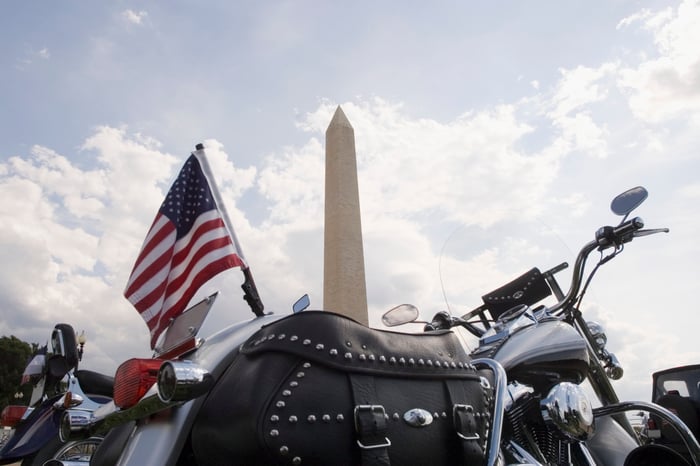Harley-Davidson (HOG -16.63%) has a narrow window of opportunity to change its direction, and it may be about to squander it.
After the resignation of CEO Matt Levatich last month and the announcement that the company was seeking a replacement, a private equity fund said it wanted to nominate two candidates to serve on the board of directors, which Harley said it would reject outright.
Because Harley's board is at least part of the problem, it suggests there may be a proxy fight at the motorcycle maker's annual shareholder meeting, a turn of events that could provide the shakeup the company desperately needs.

Image source: Getty Images.
Lost in the wilderness
Harley-Davidson is on a downward spiral caused by the aging out of its middle-aged core customer, but also because of the path it was set on by Levatich to go all-in on electric motorcycles.
There were numerous paths the bike maker could have chosen to appeal to a younger, more diverse customer base. They haven't shown the same affinity for the large, heavyweight motorcycles favored by their parents, preferring instead lighter and much cheaper bikes and scooters.
Though electric bikes could and probably should be a part of its future, the decision to make its first offering a wildly expensive bike guaranteed that few if any would want to buy it, and doomed the LiveWire to failure. Very few of the high-end electric motorcycles have sold since being introduced last October, and Harley really doesn't have the luxury of burning up stacks of cash on a vanity project.
Levatich also said Harley would be making 100 new motorcycle models in 10 years, which is a much too ambitious project that is more concerned with constantly churning out something new rather than making sure what it offers is right for the market.
Keeping the status quo
The board could have exerted some influence on the bike maker's decisions, but there is not a single director with any relevant industry experience. And now they are hunkering down and circling the wagons against outsiders.
In filings with the SEC, Harley said it had received notice in January from Impala Asset Management, which owns about a 1.2% stake in the bike maker, that it intended to nominate two candidates to the board.
Harley said although it didn't know whether Impala would follow through on the threat, "We believe that our nine nominees have the right experience, have a deep understanding of our company and its markets and are more capable than the Impala nominees to lead our company forward."
Perhaps Impala told Harley who it wanted to nominate, though that information wasn't shared with investors, but Harley also said the nominees "would not add additional skills or diversity to the board as their stated skill sets are already well represented among our nine candidates."
Jacks of all trades
Certainly the directors currently serving are able executives, but their skills sets are not relevant to motorcycles. They include individuals who founded a digital entertainment company; a GE LED lighting and solar power specialist; the co-founder of a not-for-profit sustainable business practices consultancy; former executives from Starbucks and Levi Strauss; one from the Bill & Melinda Gates Foundation; one from engine maker Cummins and aircraft manufacturer Boeing; and Chipotle Mexican Grill's CEO.
Having outside voices is critical to giving fresh perspective to a company as it helps prevent myopia from only doing things a certain way in an industry. Yet having people who understand the motorcycle industry is essential, too.
A proxy fight could reinvigorate Harley-Davidson, particularly if it injects new blood into the ecosystem that could shake up the motorcycle maker.
U.S. sales have fallen every quarter virtually unabated for five consecutive years. A CEO has to bear the lion's share of the burden for that failure, but so does its board of directors, and Harley-Davidson needs a good fight if it wants to survive.

